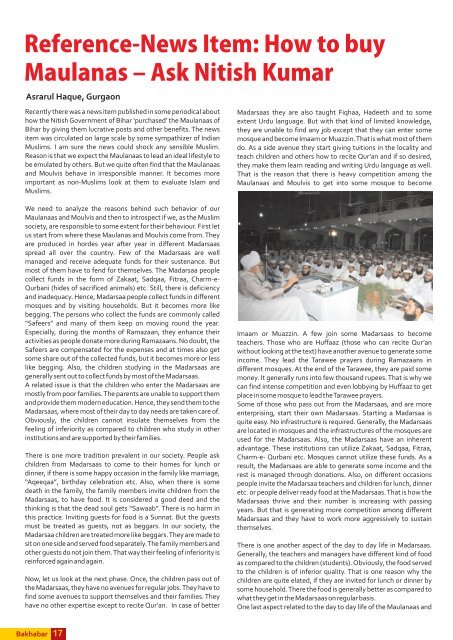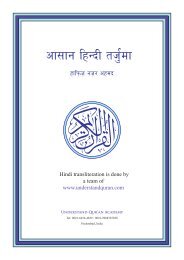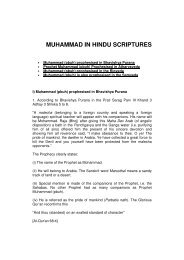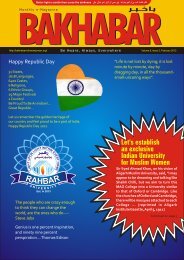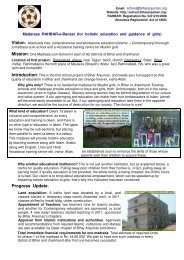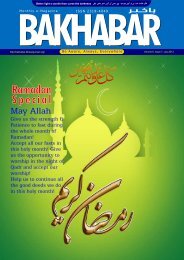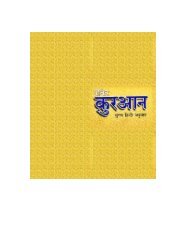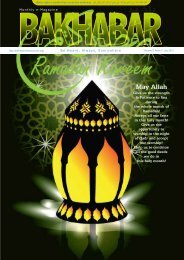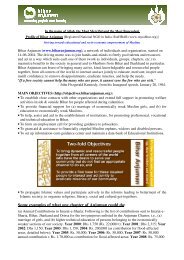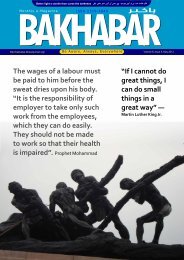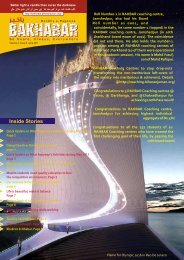Create successful ePaper yourself
Turn your PDF publications into a flip-book with our unique Google optimized e-Paper software.
Reference-News Item: How to buyMaulanas – Ask Nitish KumarAsrarul Haque, GurgaonRecently there was a news item published in some periodical abouthow the Nitish Government of <strong>Bihar</strong> ‘purchased’ the Maulanaas of<strong>Bihar</strong> by giving them lucrative posts and other benefits. The newsitem was circulated on large scale by some sympathizer of IndianMuslims. I am sure the news could shock any sensible Muslim.Reason is that we expect the Maulanaas to lead an ideal lifestyle tobe emulated by others. But we quite often find that the Maulanaasand Moulvis behave in irresponsible manner. It becomes moreimportant as non-Muslims look at them to evaluate Islam andMuslims.Madarsaas they are also taught Fiqhaa, Hadeeth and to someextent Urdu language. But with that kind of limited knowledge,they are unable to find any job except that they can enter somemosque and become Imaam or Muazzin. That is what most of themdo. As a side avenue they start giving tuitions in the locality andteach children and others how to recite Qur’an and if so desired,they make them learn reading and writing Urdu language as well.That is the reason that there is heavy competition among theMaulanaas and Moulvis to get into some mosque to becomeWe need to analyze the reasons behind such behavior of ourMaulanaas and Moulvis and then to introspect if we, as the Muslimsociety, are responsible to some extent for their behaviour. First letus start from where these Maulanas and Moulvis come from. Theyare produced in hordes year after year in different Madarsaasspread all over the country. Few of the Madarsaas are wellmanaged and receive adequate funds for their sustenance. Butmost of them have to fend for themselves. The Madarsaa peoplecollect funds in the form of Zakaat, Sadqaa, Fitraa, Charm-e-Qurbani (hides of sacrificed animals) etc. Still, there is deficiencyand inadequacy. Hence, Madarsaa people collect funds in differentmosques and by visiting households. But it becomes more likebegging. The persons who collect the funds are commonly called“Safeers” and many of them keep on moving round the year.Especially, during the months of Ramazaan, they enhance theiractivities as people donate more during Ramazaans. No doubt, theSafeers are compensated for the expenses and at times also getsome share out of the collected funds, but it becomes more or lesslike begging. Also, the children studying in the Madarsaas aregenerally sent out to collect funds by most of the Madarsaas.A related issue is that the children who enter the Madarsaas aremostly from poor families. The parents are unable to support themand provide them modern education. Hence, they send them to theMadarsaas, where most of their day to day needs are taken care of.Obviously, the children cannot insulate themselves from thefeeling of inferiority as compared to children who study in otherinstitutions and are supported by their families.There is one more tradition prevalent in our society. People askchildren from Madarsaas to come to their homes for lunch ordinner, if there is some happy occasion in the family like marriage,“Aqeeqaa”, birthday celebration etc. Also, when there is somedeath in the family, the family members invite children from theMadarsaas, to have food. It is considered a good deed and thethinking is that the dead soul gets “Sawaab”. There is no harm inthis practice. Inviting guests for food is a Sunnat. But the guestsmust be treated as guests, not as beggars. In our society, theMadarsaa children are treated more like beggars. They are made tosit on one side and served food separately. The family members andother guests do not join them. That way their feeling of inferiority isreinforced again and again.Now, let us look at the next phase. Once, the children pass out ofthe Madarsaas, they have no avenues for regular jobs. They have tofind some avenues to support themselves and their families. Theyhave no other expertise except to recite Qur’an. In case of betterImaam or Muazzin. A few join some Madarsaas to becometeachers. Those who are Huffaaz (those who can recite Qur’anwithout looking at the text) have another avenue to generate someincome. They lead the Tarawee prayers during Ramazaans indifferent mosques. At the end of the Tarawee, they are paid somemoney. It generally runs into few thousand rupees. That is why wecan find intense competition and even lobbying by Huffaaz to getplace in some mosque to lead the Tarawee prayers.Some of those who pass out from the Madarsaas, and are moreenterprising, start their own Madarsaas. Starting a Madarsaa isquite easy. No infrastructure is required. Generally, the Madarsaasare located in mosques and the infrastructures of the mosques areused for the Madarsaas. Also, the Madarsaas have an inherentadvantage. These institutions can utilize Zakaat, Sadqaa, Fitraa,Charm-e- Qurbani etc. Mosques cannot utilize these funds. As aresult, the Madarsaas are able to generate some income and therest is managed through donations. Also, on different occasionspeople invite the Madarsaa teachers and children for lunch, dinneretc. or people deliver ready food at the Madarsaas. That is how theMadarsaas thrive and their number is increasing with passingyears. But that is generating more competition among differentMadarsaas and they have to work more aggressively to sustainthemselves.There is one another aspect of the day to day life in Madarsaas.Generally, the teachers and managers have different kind of foodas compared to the children (students). Obviously, the food servedto the children is of inferior quality. That is one reason why thechildren are quite elated, if they are invited for lunch or dinner bysome household. There the food is generally better as compared towhat they get in the Madarsaas on regular basis.One last aspect related to the day to day life of the Maulanaas and<strong>Bakhabar</strong>17


